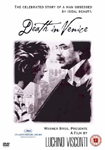

 |
Death
in Venice
|
 |
|
Ladymol's Review I hated this film. I know itís a classic, and youíre always supposed to like classics, but itís so interminably slow that I really donít have enough life left to spare for something like this. Dirk Bogartís performance seemed utterly over the top to me. He spends most of the film on the verge of a heart attack: sweating, grey, staggering. The film is a magnificent piece of costume drama, however. I canít fault the costumes. The setting, in Venice, is utterly authentic. But nothing happens. Bogart spends the whole film watching this pretty boy then he dies. The boy is pretty, but heís nothing more than that. Heís as vacant as the perfect sunset or the perfect flowers. Their whole world seems to be one of surface perfection and underlying longing, which doesnít really lend itself to a film. Iíve not read the book, but I suspect that itís a better medium to convey a story like this. Cerisaye's Review The first time I saw this movie based on a novella by Thomas Mann my lingering memory was Dirk Bogarde in a chair on the Venice Lido with hairdye creeping down his face.† And bemused, bewildered bafflement.† Now, I found the film almost unbearably sad, an elegant elegy to unattainable youth & beauty. Professor Aschenbach goes to Venice to rest & recuperate.† Heís a composer who, following personal tragedy, suffers a sort of breakdown.† He gets very little peace, however, because he develops an obsession with a beautiful youth, Tadzio (Bjorn Andresen), son of a Polish noble family staying at the same hotel by the beach.† Aschenbach struggles with infatuation, tormented by overwhelming attraction to this unobtainable boy, whose adolescent vitality so contrasts with his own decrepitude.† Andresen decorates the cover of Germaine Greerís homage to male youth, The Boy.† Visconti knew what he was doing when he cast the film. Aschenbach watches Tadzio, who knows heís the object of attention. Tadzio, a perfect illusion of youthful innocence, is a shameless coquette.† He enjoys the power he has over the older man, leading him on to see how far heíll go.† He cavorts on the beach wearing a clinging bathing costume that reveals his lithe body, flirting with Aschenbach, driving him crazy with unrequited love. Venice almost steals the show, another character in the story, decayed, corrupt, hiding its secrets.† Aschenbachís visit coincides with an outbreak of cholera, a plague that terrorises the city, though a conspiracy of silence tries to keep news of the pestilence from the tourists on whose money Venice depends.† Clearly a metaphor for the sickness that threatens to destroy Ashenbach, corruption of mind & soul.† Itís painful to watch him crumble under emotional intensity.† Most of all when he allows a barber to dye his hair and make him up like a grotesque queen, rouged and painted in a pathetic attempt to look younger.† Has he crossed the line between voyeurism and actually wanting to act on his desire?† I donít know. Andresen is so perfect itís easy to understand Aschenbachís obsession.† He never properly meets the boy, so not to spoil the illusion.† Tadzioís the one to show signs of homosexuality whereas Aschenbach is repressed.†† I wasnít sure whether Aschenbachís relationship with his colleague we see in flashback is meant to imply more than friendship.† The movie isnít very erotic though it fetishises youthful beauty.† There are moments when it gets ridiculous.† Most of us will have seen take-offs, so itís sometimes hard to keep a straight face. The film moves very slowly, with little dialogue or action.† Bogarde conveys Aschenbachís obsession for Tadzio without making him into a dirty old man.† Heís hardly predatory.† Itís Tadzio who calls the shots.† Though I wonder whether the film could be made today, sure to be condemned for promoting paedophilia.† Is there a double standard at work here, that pederasty is okay in arty movies watched by an elite?† This is a classic gay movie.† From the era when homosexuality meant no happy endings.† If itís a story about coming out, and Iím not so sure it is, then itís a pity Aschenbach seems almost to welcome his own destruction as some sort of divine punishment for daring to love so unwisely.†† Itís one of the most beautiful films youíre ever likely to see.† It gave me plenty to think about.† And that ending is still unforgettable. |